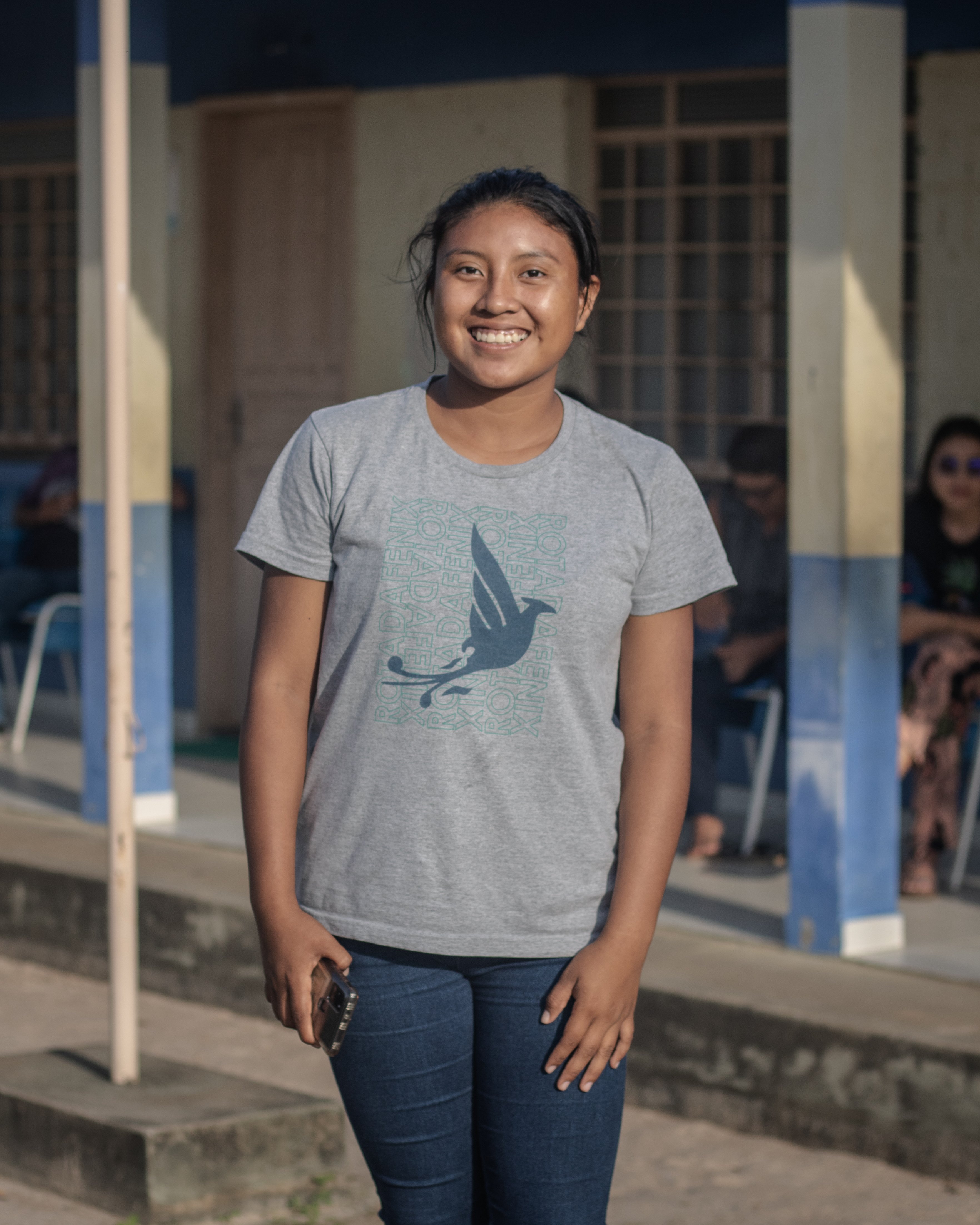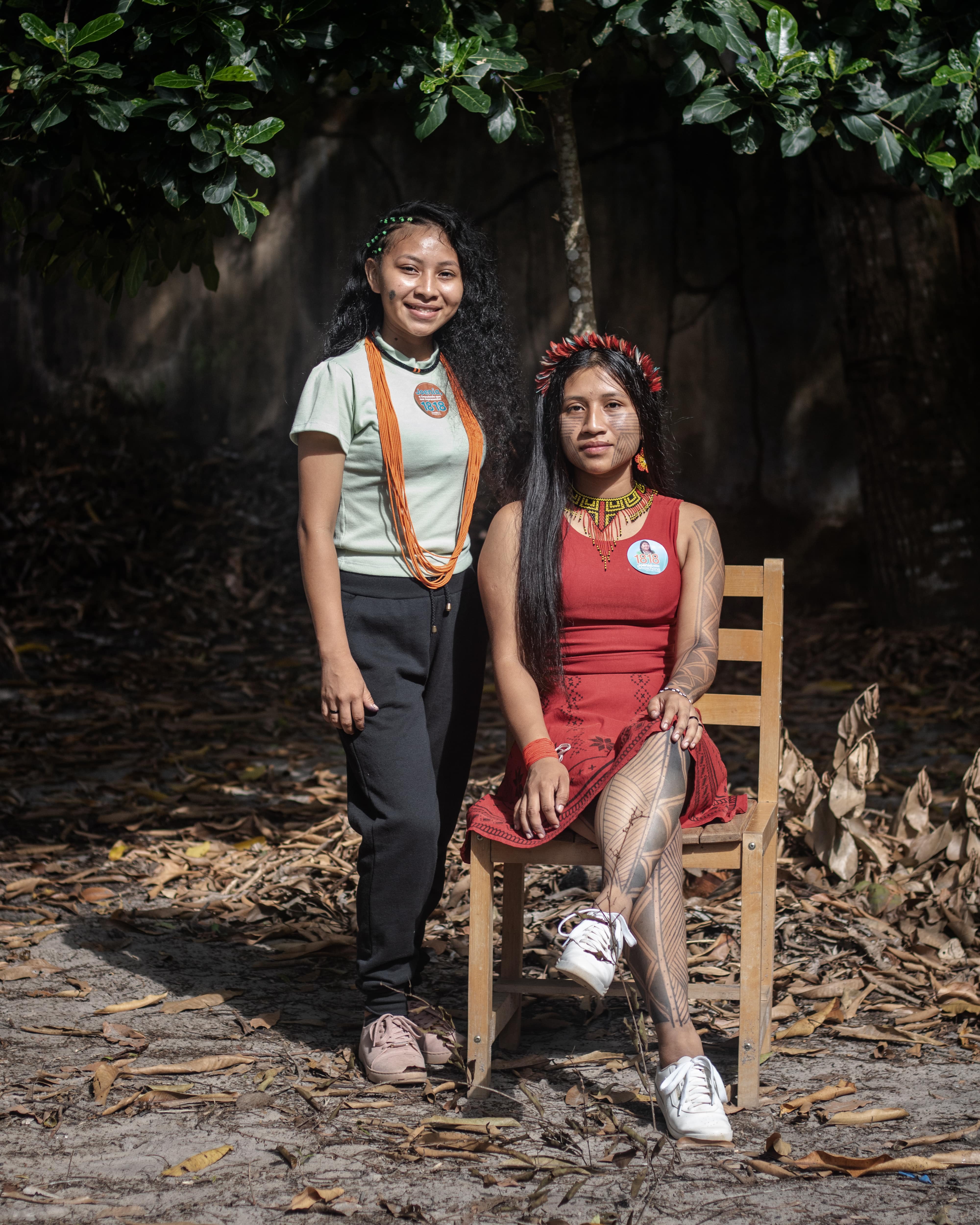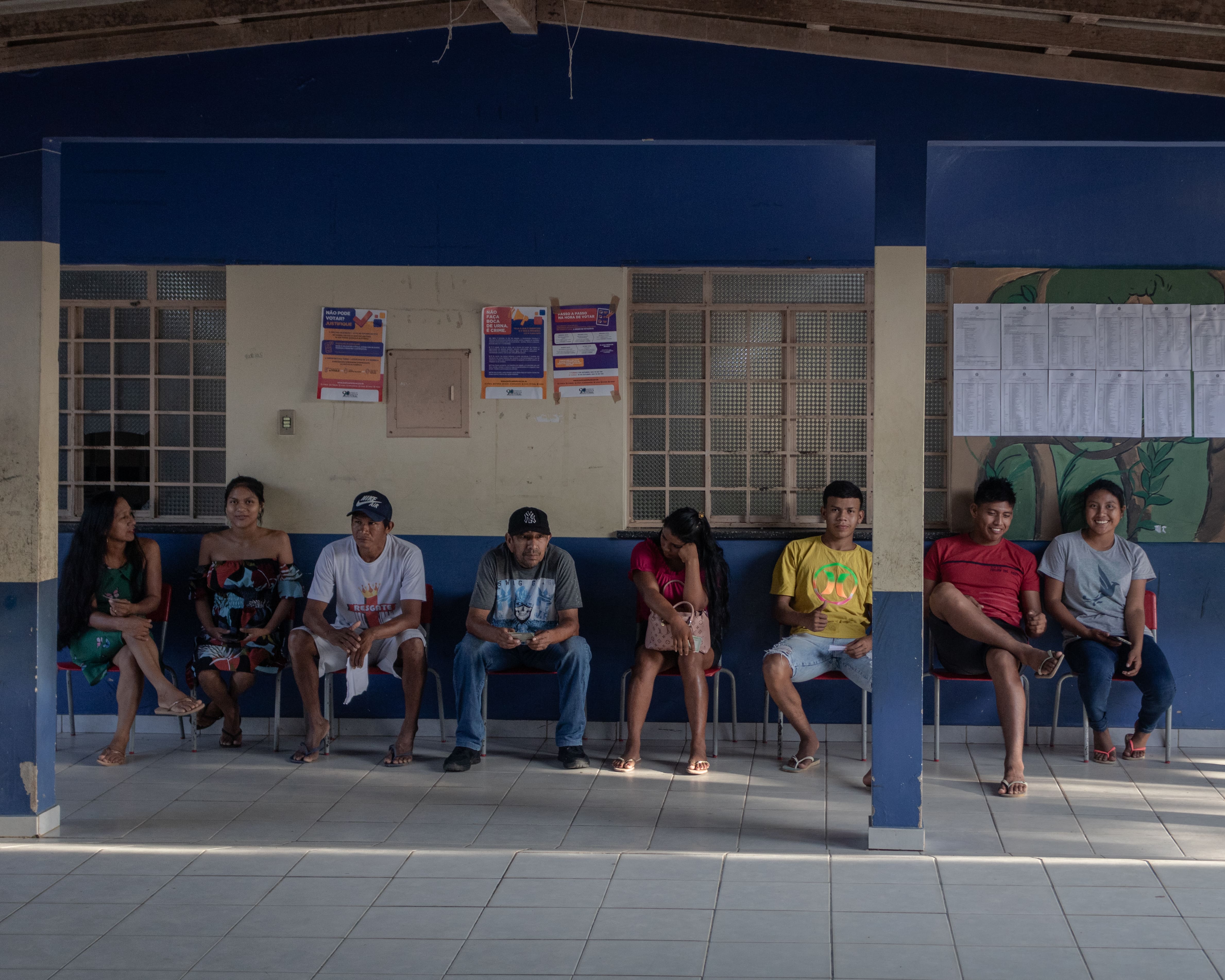As she waited her turn to vote earlier this month, Gleyniane Trajano couldn’t help but smile. Aged 17, it was the first time she had ever voted in a national election, where citizens are eligible to cast ballots as young as 16 and obligated to do so from 18.
Trajano is one of 403 registered voters in her Indigenous community who’ll return to the polls on Sunday to vote in a pivotal run-off pitting far-right incumbent Jair Bolsonaro against leftist challenger Luiz Inácio Lula da Silva – a two-time former president.
Many here in Trajano’s Indigenous territory of Tabalascada are hoping it might finally usher in a sea-change in government policies towards their neglected communities after years of what they regard as institutionalised violence and marginalisation.

“It is important that we, Indigenous people, vote conscientiously,” Trajano told The New Humanitarian. “We need to choose politicians who will represent and defend us. Some of our relatives still don’t understand that.”
Roraima, the state where Trajano’s community is located, has the highest percentage of Indigenous people in Brazil and is home to the largest Indigenous territory in the country.
As in other parts of the Amazon region, the pandemic both exposed and widened the inequalities communities here face. But there’s a long list of urgent problems the new Brazilian government will have to tackle, from police violence and rising poverty to rampant deforestation.
Indigenous lands are among the main barriers against the advance of the environmental devastation contributing to climate change. But high levels of deforestation continue. Data from the Amazon Deforestation Monitoring Program shows that more than 13,000 square kilometres of forest were torn down between August 2020 and July 2021 – the largest rate of destruction on record since 2006.
“The damage to the forest causes reductions in the availability of food, drying of rivers and streams, wildfires, and climate change,” said Guajajara, the Indigenous leader newly elected to Congress. “All of that has a direct impact inside the villages and territories.”
She is calling on the next government to fight deforestation and strengthen institutions that were “entirely neglected during Bolsonaro’s government”.
Several NGOs who monitor the Amazon back up this assessment. According to HRW’s submission to the Human Rights Council, Bolsonaro’s government “weakened environmental law enforcement, effectively encouraging criminal groups that are driving the destruction of the Amazon.”
Throughout the past decade, Brazil has led the world in the number of killings of environmental defenders, according to Global Witness. Since 2012, there have been 342 lethal attacks, 85% of which took place within the Amazon region.
Guajajara added that territorial demarcations – the formal recognition of Indigenous peoples' rights to their own lands – has also stalled under Bolsonaro’s presidency, leading to conflicts.
“It is vital to guarantee the protection of territories and of the people inside them,” she said. “Even inside demarcated areas, violence has been escalating with the increase of invasions. We need strong protection policies.”
But Indigenous communities haven’t been waiting for a change of president to take action. They have been taking matters into their own hands, through territorial protection and surveillance groups.
“These groups were created by the tuxauas [Indigenous leaders] themselves,” explained Wapichana, the coordinator for Indigenous youth in Roraima. “They oversee and protect the territories – something that should be the responsibility of the federal government.”
While Bolsonaro has his supporters here too, many in Tabalascada are very clear about just how much is on the line on Sunday.
“No matter how much we defend our agenda, negotiations with the executive will be very different depending on who is in power,” said Guajajara. “And we cannot survive another four years under Bolsonaro.”
COVID-19 overwhelmed hospitals in the Amazon, and it took a landmark Supreme Court ruling to force Bolsonaro’s government to protect Indigenous people, including getting SESAI, the Special Secretariat for Indigenous Health, to recognise urban Indigenous populations for extra assistance.
Since the start of the pandemic, Bolsonaro belittled the gravity of the deadly virus, cast doubt on vaccines, joined anti-lockdown protests, and even threatened state governors who issued sanitary decrees to try to limit its spread.
Over 687,000 deaths in Brazil have been attributed to COVID-19, the highest national tally globally apart from the United States. A parliamentary commission reported over 400,000 deaths could have been avoided, and Indigenous people blame the fact that their communities suffered the highest mortality rates on government mismanagement.
Raquel Wapichana, state coordinator in Roraima for Indigenous youth, was quick to stress that the pandemic was far from over: People are still suffering from the virus, while health centres lack medication and transport for the sick.
“It has been very painful, as we have lost leaders who were a part of our history of struggles for education, health, and territory,” she told The New Humanitarian. “Our ancestors had never seen anything like this, so it was particularly hard on them.”

Indigenous communities in Brazil face numerous other challenges: For instance, the annual number of invasions of Indigenous lands by ranchers and miners in 2021 was triple the number from 2018, before Bolsonaro took office.
Sonia Guajajara, a leading Indigenous leader elected to Congress during the general elections on 2 October, called Bolsonaro’s presidency ”insitutional genocide” towards Indigenous populations.
“We need strong protection policies that will ensure the safety of people in the territories,” she told The New Humanitarian. “We particularly need public policies for Indigenous peoples in urban contexts, as they are completely sidelined as if they didn’t exist.”
Guajajara, like many other Indigenous leaders, is supporting Lula’s candidacy. Polls have consistently put him ahead of Bolsonaro, but the fuelling of false fears over voter fraud by the incumbent, amid concerns he might not accept defeat, has his critics worried.
“It is impossible to conceive the size of the damage to be caused by another four years under Bolsonaro, “ Guajajara said.
A combination of factors – ranging from rising poverty and hunger to racism and police violence – stirred a record number of candidates representing marginalised communities to run for office during the general elections.
While those candidates won several seats in Congress, community organisations say extraordinary efforts will be needed to reverse the trend of growing humanitarian needs.
Even if Bolsonaro doesn’t win the run-off, a majority of the lower house and much of the Senate will be run by members of his party and its allies, making it harder to pass measures to help Indigenous and other vulnerable communities.
“We have experienced gross setbacks during the current government,” Wapichana said. “So we hope the next one will provide more visibility to Indigenous peoples, both inside our territories and for those who live in the city.”
A poverty and hunger crisis catalysed by the pandemic
COVID-19’s long-lasting effects can also still be felt acutely in Brazil’s sprawling favelas, the poor urban communities where more than 17 million people – around 8% of the overall population of 213 million – live.
During the first months of the pandemic, the number of unemployed reached a record 14.8 million. To help offset the dire economic conditions, Bolsonaro’s government began providing pandemic support in the form of cash assistance, beginning in April 2020. The final payment was made in October 2021.
“This relief was already overdue. At that point, NGOs had already been supporting people for months,” said Francis Santos, president of the Minas Gerais chapter of the Unified Center of Favelas, or CUFA, an NGO that aims to empower favela residents. “It did play a very important role in mitigating the situation,” said Santos. “But there were also many other actions taking place.”
With hunger and unemployment on the rise, CUFA has been providing food assistance to roughly 4.5 million families in 5,000 favelas across the country since 2020.
Eight years after Brazil dropped off of the World Food Programme’s Hunger Map, food insecurity is again becoming a problem.
Read more → Pandemic puts Brazil back on the world hunger map
A post-pandemic survey conducted by the Brazilian Research Network on Food and Nutrition Sovereignty and Security shows that 58.7% of Brazilians are facing some level of hunger. People of colour are worse hit, with 65% of households where the primary income earner is Black or brown, not having enough to eat.
The end of the government’s pandemic assistance a year ago led to what Rio’s Centre for Social Policies aptly termed “the poverty rollercoaster”: The percentage of Brazilians experiencing poverty returned to its peak at over 13%, set at the start of the pandemic.
“Hunger is not only related to a crisis in employment or to low income levels,” Antônio Claret, an expert on poverty reduction policies in Brazil, told The New Humanitarian. “It is about a dismantling of public policies for food security.”
The next government will have to look at ways to create new programmes to avoid that rollercoaster effect, Claret noted.
“The market alone cannot solve the problem – especially now,” he said. “We need policies for family farming, better food at schools, and social assistance. This is not just a challenge for the next president, but for the next generations.”
While Bolsonaro has at times denied the existence of hunger in the country, his government did start Auxílio Brasil, to “integrate into one programme several public policies for social assistance, health, education, employment, and income.” Yet even among families who have received that assistance, there has been an increase in moderate and severe food insecurity.
The day after the first round of voting, Bolsonaro’s government announced that emergency aid payments would be advanced by seven days – ensuring they were issued a week before the run-off instead of afterwards, prompting accusations from the opposition that this was a ploy to attract votes from the most vulnerable.
State-sponsored violence
It’s not only in the Indigenous territories that the Brazilian government has been accused of supporting violent campaigns. During Bolsonaro’s tenure, the government has conducted near-daily police raids in favelas, citing the presence of criminal gangs.
Even during the pandemic – and in spite of rulings from the Supreme Court restricting such operations – the states of Bahia, Ceará, Pernambucano, Rio de Janeiro, and São Paulo collectively registered a police incursion every hour, and a death every 10 hours.
While the war on drugs and gun violence are usually used as justifications for such actions, less than 26% of raids resulted in the apprehension of narcotics, and only in 15% of cases were weapons seized.
According to the Brazilian Forum of Public Safety, police killed over 6,100 people in 2021. Since 2013, when the NGO first started monitoring, at least 43,000 victims have died as a result of the actions of civil and military police, its 2022 annual report said.
“When Bolsonaro became president, the state security forces started to play a much more prominent role,” said Patrícia Oliveira, a member of the Network of Mothers and Relatives of Victims of State Terrorism.
“As human rights activists, we cannot vote for someone who speaks in support of torture,” Oliveira told The New Humanitarian. “State violence has always been a reality in Brazil. But, under Bolsonaro, the security forces and the president himself promote and reinforce this violence.”

Lula was in power when Maria Dalva Correia da Silva lost her 19-year-old son during a police operation in Rio de Janeiro’s Borel favela in 2003. But when she casts her vote for the second time this year, on Sunday, she will once again type 13 – the number of Lula’s party – on the electronic ballots.
Dalva told The New Humanitarian she has witnessed a growing impunity for police violence under Bolsonaro, and at least Lula ordered an investigation into her son’s death as part of an inquiry by the Human Rights Commission.
Ahead of a recent review of Brazil’s record at the UN Human Rights Council, Human Rights Watch reported that Bolsonaro “encouraged police violence and proposed legislative initiatives that would make it more difficult to hold police officers accountable [for abuses].” HRW recommended that authorities devise a plan to curb police violence and adopt new protocols that follow international standards to investigate cases of police abuse.
While the number of deaths resulting from police actions fell in 2021 by 4.2%, deaths resulting from police actions still represent 12.9% of all intentional killings. According to the Brazilian Forum of Public Safety, these are indications that abuses and executions remain a common practice in some police institutions.
“These actions take place with the endorsement of a society that believes ‘a good criminal is a dead criminal’,” said Dalva. “Today, we fight for the memory and dignity of our deceased; but we also fight to prevent more young people from dying.”
Edited by Paula Dupraz-Dobias and Pradnya Joshi.




